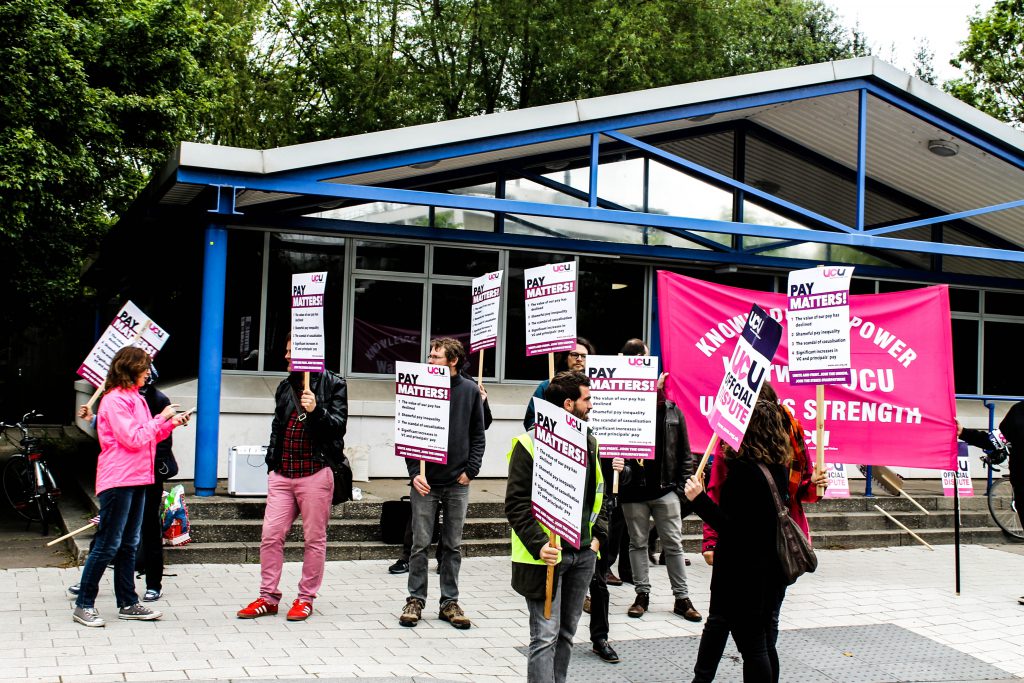
Yesterday members of the University and College Union (UCU) finished a 48 hour strike. This was the first time the UCU had ever extended a strike for more than one day, but the pay dispute will continue.
On my picket line yesterday morning, I was struck by how many students were taking leaflets, smiling at the pickets and wishing them good luck, and then immediately crossing the picket line.
In part, this is a result of the fact at least one, maybe two generations have grown up without ever really encountering the tactical repertoire of organised labour. I’m sure most of those students crossing picket lines genuinely didn’t know they were doing anything wrong. Many – perhaps most – won’t have had a clue what ‘scab’ meant in that context.
But beyond that, it also speaks to a greater challenge. We need new strike tactics that can produce new forms of class power in the workplace – but also in society more generally. We need strikes to regain their edge – and that can only be done from the bottom up, through the efforts of militants on the ground.
It is in this context that people across Europe have begun to talk about the ‘social strike’. So what could be done to ‘socialise’ the UCU dispute in workplaces and communities as we move beyond these first two strike days?
Decommodify education.
We know this dispute is about more than just pay. Really, academic workers in higher education are now engaged in a fight against marketisation, not just against crap working conditions. If the strike remains isolated as a contractual dispute, it might fail to meet its own limited set of demands, and it will certainly fail to make the most of its political potential. To escape this possible isolation of the strike, students and staff need to take up the fight against the process of commodification itself.
In the spirit of William Benbow’s 19th century vision of the general strike as the Grand National Holiday, we need to use the time we take back from our jobs in the act of striking to build a different world. To use the technical terms, we need to support the self-valorisation of the class, as well as disrupting the valorisation of capital.
Unofficially, across the country and on every day of the week, many supermarket workers are involved in sabotaging tills, not properly scanning items and undercharging for shopping. Officially, junior doctors recently held ‘meet the doctors’ events in town centres during their strike days to teach members of the public how to do CPR. Both these unofficial and official forms of action should be taken as examples of what could be done by lecturers, in terms of turning problems with work into something that collectively benefits us all.
While striking they could give lectures that are free to the public, organise temporary ‘free university’ initiatives, participate in the mass publication of privatised academic research and expropriate textbooks. In doing so, we could turn education from a commodity into a general social process, and contribute to our collective strength and happiness.
This immediate inversion of the tendency towards marketisation and commodification would make it very obvious that this strike is about everyone, and goes beyond one set of workplaces and one set of issues. By starting to turn education into a social good, lecturers would immediately and directly begin to develop a form of social and community power that could then be directed back, against university managers and the government.
One big antagonism.
The junior doctors strike has become progressively more socialised (and progressively more powerful) as it has transitioned from a purely contractual struggle to a struggle over the future of the NHS. It’s been generalised from the bottom up, so that on the last set of strike days, we saw not only big supportive demonstrations and picket lines at hospitals, but also people going on the attack and picketing the profiteers.
In this expansion, we began to see a link develop between doctors fighting over their direct wage relation with their employer, and members of the public fighting over the social wage with the government. The potential for such a staff and student unity in both social and direct wage struggles is perhaps one of the most exciting avenues this dispute could pursue. But, isn’t the student movement quiet at the moment? And what ‘social wage’ is there for students to fight for?
At the moment, over 1000 students are on rent strike in London. They are fighting the same fight as the members of the UCU, but from a different angle. Both are struggles over how much value the working class is capable of taking from capital, through the dual mediations of the state and higher education. Rent strikes and labour strikes need to be combined, and their common features need to be developed. If the UCU strike action continues into the next academic year, as it well might, students need to aim to coincide their rent strikes with academics’ labour strikes.
That development would begin to produce a greater unity between students and staff, and might start to get students to understand why they shouldn’t cross a picket line, and why they need to fight alongside their staff. And beyond this expanding unity of those going on strike, managers facing not only the withdrawal of labour, but also the withdrawal of rent will be in a much worse position to resist either initiative. Socialising a strike is not just about making nice theoretical points, it is about increasing our power to win.
Photo: Max Kennedy/Warwick for Free Education
–
If you want to support media for a different politics, you can donate or subscribe to Novara Media at support.novaramedia.com.